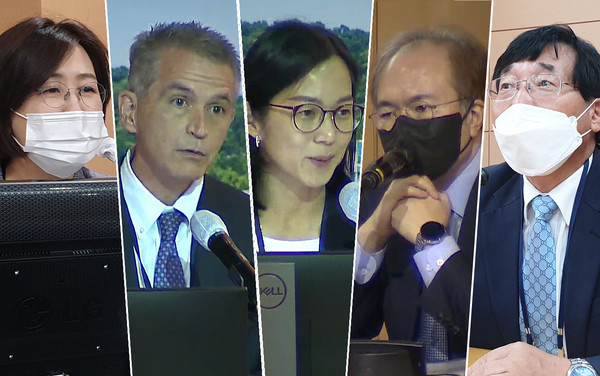The Korean government emphasized the importance of accumulating big data for cancer research, but its failure to support manpower and resources has made the task extremely slow, experts said.
Such criticism came at an international symposium, “AI and Big Data in Cancer: from Knowledge to Action,” hosted by the National Cancer Center (NCC) on Wednesday.

At the symposium, oncology experts introduced U.S. programs that utilize various types of big data to accelerate health research. The two examples are the All of Us Research Program, a genome analysis program, and the National Cancer Institute (NCI) Cancer Research Data Commons (CRDC).
The U.S. National Institutes of Health (NIH) has been conducting the All of Us project since 2018 to collect genetic information of over one million people for disease research.
The data collected through a cloud-based digital platform includes health-related questionnaires, medical records, body measurements, lifelog information using wearable devices, digital health data, and biological samples.
Paul Alan Harris, a professor of biomedical informatics at Vanderbilt University Medical Center, introduced the All of Us program at the symposium.
“Recently, the research program released the first genomic dataset of nearly 100,000 whole-genome sequences and 165,000 genotyping arrays,” said Harris, the principal researcher of the All of Us program.
Erika Kim, Biomedical Informatics Program Director at the NCI, said the NCI developed CRDC. This virtual data ecosystem provides researchers with big data access to identify the cause of cancer, improve therapies, and develop preventive tools.
Using CRDC, researchers can analyze, share, and store the study results on the newest cloud-based platform, she said.
In Korea, the Ministry of Health and Welfare is operating the Korea-Clinical data Utilization Network for Research Excellence (K-CURE) project to collect clinical data for cancer research.
The government designated NCC as the national cancer data center in September. Its role is to build cancer big data under the government’s fourth cancer management comprehensive plan.
Choi Kui-son, head of the Cancer Big Data Center at NCC, said the national cancer data center would participate in the K-CURE project to create a network to utilize cancer clinical data and collect and disclose multi-omics data together with clinical data in cancer protein genomic research.
“When building clinical data, the most important thing is standardization. We have to decide which items we will define and how to collect data,” Choi said.
Since last year, NCC has been working with medical societies to set up standard items and standard codes, she went on to say. NCC has developed a guidebook with standard items and definitions for five types of cancer so far, she added.
Korea lags in accumulating big data for cancer research
Although NCC began to play its role as the national cancer data center, it failed to get support for additional manpower. The government refused to raise the number of employees at NCC to operate the national cancer data center.
Seo Hong-gwan, president of NCC, said it implemented the national cancer data center project without additional staff. “If you don’t support us and ask us to do the work, we don’t have a choice but to become slow.”
Seo noted that Korea’s biggest advantage in health data was that the nation had universal health insurance.
Although it is not easy to make different hospitals’ data compatible, it is much easier to build big data in health thanks to the data of the National Health Insurance Service. “If we could speed up the work, we can make the world’s best big data in health. The problem is the speed.”
Kwon Jun-wook, director of the Korea National Institute of Health (NIH) under the Korea Disease Control and Prevention Agency (KCDA), said he felt “very anxious” about the slow pace of building big data in oncology.
“Even the U.S. FDA, a regulatory agency, is aggressive about data building and recommends donations. The U.S. has been disclosing 500,000 pieces of health data every week since 2018,” Kwon said, adding that the U.K. has Biobank collecting big data in health. “At this important moment, I feel sorry that Korea has yet to allocate a budget for this.”
Kwon pointed out that government agencies are too divided to collect big data on health. However, he said the Korea NIH would make more efforts for coordination and reflect the work in the preliminary feasibility project.

